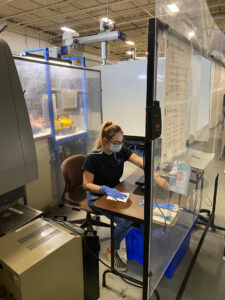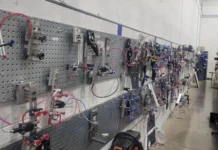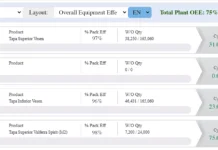by Cynthia Kustush, contributing writer, Plastics Business
Plastics processors are accustomed to pressures of new program launches and meeting customer expectations. Whether the program launch entails implementing production using new molds or transferred molds, there are processes to follow and deadlines to meet. But today, processors are approaching program launches a bit differently. The onset of the COVID-19 pandemic has caused many of them to change the way they interact with customers and their teams and, in some cases, how they handle the molds as they move through the qualification process.
Communication more critical with coronavirus

In a white paper issued recently, Diversified Plastics, Inc., Minneapolis, Minnesota, relates ways to minimize risk and avoid pitfalls when taking on transfer tooling. The white paper opens by stating, “Every mold transfer is a challenge. Transferring tools from one plastic injection molding company to a new supplier, with uninterrupted production, requires up-front planning and effective communication for a successful outcome.” According to Annette Lund, vice president, “effective communications” has become even more important since COVID-19 came on the scene.
Diversified Plastics is a full-service provider of prototyping, plastic injection molding, digital additive manufacturing, assembly and value-added services for a wide range of products for customers in industries like aerospace, water filtration, medical, avionics and lithium ion batteries. Working closely with the teams within those various industries is the key to a smooth launch.
“Whether it is a tooling transfer or a new program launch, communication of expectations from both the customer company and the injection molder is absolutely critical,” she says. “Everyone involved – from engineering to purchasing to quality, production and tooling – needs to know the capabilities and requirements for a successful outcome. The onset of the coronavirus has made it necessary to alter the way we accomplish this.”
As with most other companies, Lund says social distancing and the wearing of masks has become the norm throughout Diversified Plastics’ Minneapolis plant and at its sister company, Pacific Plastics Injection Molding in Vista, California. “Everyone wears masks when outside of their work area. Face-to-face meetings are smaller and more spread out and, if possible, everyone tries to social distance when talking to someone,” she says. “We are even careful with treats during meetings because we do not want everyone’s hands choosing a doughnut from the same box. It is just a different mindset, which we expect to continue for quite some time.”
Still, the work must continue, and Lund says that, despite social distancing, there are many questions that must be answered, and mysteries solved before a program can launch – especially where transfer tooling is concerned. Every transfer tool must be inspected, and that takes time. “Besides customer expectations, we need to learn a multitude of things about the mold including how the part is used, what the critical-to-function dimensions are, if any assembly is required, how many cycles has the mold run and what material it was manufactured with,” she said. “If it is old and has run millions of cycles, and particularly if it is made using a soft steel, it may be at the end of its life. Buyers often move tools because they are not getting the performance expected, but they may be unaware of or ignoring issues. CAD files and maintenance records are critical, if you can get them for a transfer tool. Again, communication is very important here.”
Lund says that when the pandemic first hit, employees would investigate to learn who the last person was who touched the tooling or products shipped and whether they wore gloves when handling it. “We asked how long it took to transport the shipment before it reached our dock,” she says. “That way, we would know whether we had to quarantine the shipment.” She added that, in recent weeks, the hype about germs from the virus subsisting on surfaces for long periods of time has relaxed, so investigations like this have subsided for the time being.
Processes critical to quick launch
Similarly, custom injection molding company Intertech Plastics, Denver, Colorado, is meeting the challenges due to COVID-19 by implementing social distancing measures and adhering to homegrown protocols like its New Product Introduction (NPI) process. According to Jim Kepler, president, all program launches, regardless of deadline or urgency, go through the NPI process in order to satisfy customer expectations while also preventing costly rework or course corrections that happen when critical program details are missed.
“Our NPI process is organized into ‘gates’ or chapters that require stakeholder input and approvals as we follow the methodical roadmap of a program launch,” Kepler says. “We use a RACI chart (RACI is an acronym for responsible, accountable, consulted and informed) at each gate approval to keep our team accountable to the decisions we make.” Like Diversified Plastics, Intertech puts a premium on communications with its customers. “Customer input is a large part of our success, and the NPI roadmap provides guidance for specifications and critical expectations throughout this process.”
Intertech specializes in highly engineered, tight-tolerance components and assemblies, serving the medical device, industrial and consumer markets. In addition to injection molding, the company offers product design and engineering, mold manufacturing, assembly and packaging, automation design and implementation, and part decorating services.
In response to the COVID-19 pandemic, Intertech partnered with Genesis Plastics Technologies of Greeley, Colorado, to manufacture face masks, helping eliminate the shortage of personal protection equipment. An Intertech announcement says, “In less than five days, the Intertech team designed and built a mold and started molding the headband for face masks. The company now is producing thousands of face masks a day.”
Asked how the urgency and amplified demand for the face masks affected Intertech’s normal program launch process, Kepler said the team learned that it was especially important to follow the NPI process “to the letter. Each step has a purpose and there are no shortcuts. It is our experience that a program launched quickly, but not accurately, can be costly for both parties. Secondly, having strong partnerships with our suppliers proved to be a game changer for us in expediting launches because when you have trust you can move with greater speed.”
Internally, protecting the health and safety of its workers was a priority. “We needed to stabilize our production environment and eliminate disruption to our ‘employee ecosystem’,” Kepler said, adding that the company often relies on a small percentage of temporary labor to accommodate surges in production demand. This was the case with the face mask program. “Any exposure to COVID-19, by introducing new and unfamiliar employees to our controlled environment, was a risk we were unwilling to take, so we decided to freeze our hiring of temporary labor.”
As production demands increased, Kepler says the hiring freeze became an obstacle Intertech needed to overcome. Our solution came back to the foundational value of trust, and we extended employment opportunities to the friends and family of our stable and trusted workforce.”
Following the logic that “good people know good people,” the company communicated its “direct hire” needs to its existing employees and offered a referral bonus. “This was a tremendous success,” Kepler says. “We were able to hire six of the eight employees in just one week.”
Collaboration, creativity and community
With 75% of its business concerned with medical devices, one of which was a ventilator, there was no doubt that PTA Plastics, Oxford, Connecticut, an employee-owned custom injection molder, would be deemed an essential business when the coronavirus hit. PTA President Rich Dorans said the ventilator project already was in progress, primarily for military use, but soon the company was asked to ramp up production from manufacturing about 5,000 units a year to 10,000 a month. “We had to prepare very, very quickly for that. The parts were originally being produced and assembled only at our Connecticut plant, but we moved quite a bit of production to Colorado,” he said. “Because of our ISO 13485 certification, starting production at the second facilitywas technically a project launch because we still must validate the manufacturing process.”
With a lot of collaboration between the customer’s and PTA’s engineering departments – and by working closely with suppliers to install, validate and train on new equipment purchased for the increased production capacity – Dorans said PTA was able to launch the project in Colorado much more quickly. “In an ordinary launch, just managing validation documents and getting approvals can take up to three weeks, but because everyone shared the same goals, we were highly successful in launching quickly. It required a true partnership.”
In addition to the ventilators, which were mandated under the Defense Production Act (DPA), PTA Plastics also is producing patient monitors (mainly pulsometers) and ramped up production from about 10,000 units per year to 30,000 units in three months.
As with Intertech Plastics, the need for greatly increased production of products required greatly increased manpower. “HR had to step up every bit as much as the engineering, purchasing, maintenance and other departments,” Dorans said, adding that PTA had to get creative with how they attracted and recruited new employees. “We thought that with so many restaurants and retail establishments closing that we could quickly capture that employee base, but they were getting more and more money on unemployment, and many people did not want to work.”
Enter Facebook.com. Dorans explained that PTA is predominantly a LinkedIn company, but it was suggested that Facebook might offer better luck with attracting more motivated prospects. “We targeted people like bartenders, salon workers and teachers who were looking for work,” he says. “We found that if it fit their schedule, they were willing to come in and be trained. It really helped to fill the gaps.”
It can be tough training so many new employees, Dorans said, because it is imperative that quality standards are maintained for every project. In addition, to protect employees both old and new, precautions like social distancing, installing dividers between workstations and masks were provided. “We also use face masks on top of masks during training when people have to be in closer proximity of each other,” he said. Temperatures are checked every day and protocols change weekly, as Dorans and his management team monitor the latest safety recommendations issued by local and federal governments.
For example, when social distancing was mandated in the workplace, PTA revised its assembly operations by rearranging its shop floor to allow at least six feet between line workers and installing conveyor systems to safely deliver parts from one station to the next vs. just handing them off.
Asked whether any permanent changes have been made based on what had to happen to ramp up production so quickly, Dorans said PTA is taking that momentum and working to sustain and enhance it. In 2019, the company formed a PTA 2030 Team, the purpose of which is to create a vision and a purpose around what PTA Plastics and the world will look like in ten years. “We know that, no matter how things turned out or how fortunate we have been through this year, we can never be satisfied with the status quo.” Sustainability and being socially responsible by donating to local food banks and patronizing local restaurants and businesses are some of the changes that will become permanent ways to give back.
Virtually speaking
Since the onset of COVID-19, virtual meetings now are largely the norm, rather than gathering team members and customers in a conference room together. Diversified Plastics, PTA Plastics and Intertech Plastics are using mostly digital means of communication to share job data, program changes and updates. If on-site meetings are needed, the number of participants is very limited.
For example, Diversified Plastics’ Lund said that if companies involved in a program launch even allow on-site visits, smaller teams are sent – usually only one or two people. “Some companies are not allowing their employees to pay visits. It is starting to loosen up, and we are doing temperature checks when customers visit, but we are not sure if it will continue to return to pre-pandemic standards.” Social distancing requirements limit the number of people that can meet in a conference room, so the company is complying by limiting the number of visitors at any given time. “Virtual meetings are more common because, in addition to restrictions, there also is the risk that someone could be asymptomatic,” she added. “As this continues, everyone is getting more comfortable with being on camera, so I would not be surprised if virtual meetings replace conference calls in the future.”
At Intertech, all NPI process meetings are virtual now. “The changes in our work environment because of COVID-19 have elevated the importance of communication and connectivity,” Kepler stated. “The need for clear and powerful presentations that convey quoting data, design recommendations and so on has been very important. For example, calculations are now made visible to all participants to show how machine capacity was analyzed. We have also added templates to our NPI process to assist in communicating important information consistently.”
In the long run, Kepler believes that Intertech’s efforts to stay connected using virtual meetings have improved the ability to make decisions quickly. “Virtual meetings often occur multiple times throughout the day, driving results faster and eliminating the constraints of physical meetings.”
Dorans expresses the same view, saying that PTA’s Zoom meetings have made discussions and decision-making processes more efficient. “We required everyone to have their cameras on so we could see each other and have more effective interaction,” he explained. While virtual meetings with suppliers were few, customer meetings were held virtually in place of plant visits for mold qualifications. “We sent a lot of FedEx packages back and forth with parts in them. When they were received, we met on Zoom to discuss any modifications and so on.”
Although manufacturing companies across the US – and across the world – still are learning to navigate the changes forced upon them by COVID-19, the ability to adjust quickly, fall back on existing procedures and communicate effectively are key strategies to ensure new product launches and transfer programs are executed efficiently.





